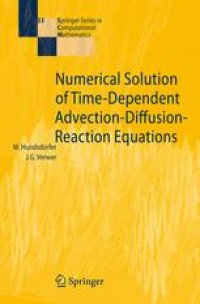
Ebook: Numerical Solution of Time-Dependent Advection-Diffusion-Reaction Equations
- Tags: Partial Differential Equations, Ordinary Differential Equations, Numerical Analysis
- Series: Springer Series in Computational Mathematics 33
- Year: 2003
- Publisher: Springer-Verlag Berlin Heidelberg
- Edition: 1
- Language: English
- pdf
This book describes numerical methods for partial differential equations (PDEs) coupling advection, diffusion and reaction terms, encompassing methods for hyperbolic, parabolic and stiff and nonstiff ordinary differential equations (ODEs). The emphasis lies on time-dependent transport-chemistry problems, describing e.g. the evolution of concentrations in environmental and biological applications. Along with the common topics of stability and convergence, much attention is paid on how to prevent spurious, negative concentrations and oscillations, both in space and time. Many of the theoretical aspects are illustrated by numerical experiments on models from biology, chemistry and physics. A unified approach is followed by emphasizing the method of lines or semi-discretization. In this regard this book differs substantially from more specialized textbooks which deal exclusively with either PDEs or ODEs. This book treats integration methods suitable for both classes of problems and thus is of interest to PDE researchers unfamiliar with advanced numerical ODE methods, as well as to ODE researchers unaware of the vast amount of interesting results on numerical PDEs. The first chapter provides a self-contained introduction to the field and can be used for an undergraduate course on the numerical solution of PDEs. The remaining four chapters are more specialized and of interest to researchers, practitioners and graduate students from numerical mathematics, scientific computing, computational physics and other computational sciences.
This book describes numerical methods for partial differential equations (PDEs) coupling advection, diffusion and reaction terms, encompassing methods for hyperbolic, parabolic and stiff and nonstiff ordinary differential equations (ODEs). The emphasis lies on time-dependent transport-chemistry problems, describing e.g. the evolution of concentrations in environmental and biological applications. Along with the common topics of stability and convergence, much attention is paid on how to prevent spurious, negative concentrations and oscillations, both in space and time. Many of the theoretical aspects are illustrated by numerical experiments on models from biology, chemistry and physics. A unified approach is followed by emphasizing the method of lines or semi-discretization. In this regard this book differs substantially from more specialized textbooks which deal exclusively with either PDEs or ODEs. This book treats integration methods suitable for both classes of problems and thus is of interest to PDE researchers unfamiliar with advanced numerical ODE methods, as well as to ODE researchers unaware of the vast amount of interesting results on numerical PDEs. The first chapter provides a self-contained introduction to the field and can be used for an undergraduate course on the numerical solution of PDEs. The remaining four chapters are more specialized and of interest to researchers, practitioners and graduate students from numerical mathematics, scientific computing, computational physics and other computational sciences.
This book describes numerical methods for partial differential equations (PDEs) coupling advection, diffusion and reaction terms, encompassing methods for hyperbolic, parabolic and stiff and nonstiff ordinary differential equations (ODEs). The emphasis lies on time-dependent transport-chemistry problems, describing e.g. the evolution of concentrations in environmental and biological applications. Along with the common topics of stability and convergence, much attention is paid on how to prevent spurious, negative concentrations and oscillations, both in space and time. Many of the theoretical aspects are illustrated by numerical experiments on models from biology, chemistry and physics. A unified approach is followed by emphasizing the method of lines or semi-discretization. In this regard this book differs substantially from more specialized textbooks which deal exclusively with either PDEs or ODEs. This book treats integration methods suitable for both classes of problems and thus is of interest to PDE researchers unfamiliar with advanced numerical ODE methods, as well as to ODE researchers unaware of the vast amount of interesting results on numerical PDEs. The first chapter provides a self-contained introduction to the field and can be used for an undergraduate course on the numerical solution of PDEs. The remaining four chapters are more specialized and of interest to researchers, practitioners and graduate students from numerical mathematics, scientific computing, computational physics and other computational sciences.
Content:
Front Matter....Pages I-X
Basic Concepts and Discretizations....Pages 1-138
Time Integration Methods....Pages 139-214
Advection-Diffusion Discretizations....Pages 215-323
Splitting Methods....Pages 325-417
Stabilized Explicit Runge-Kutta Methods....Pages 419-445
Back Matter....Pages 447-471
This book describes numerical methods for partial differential equations (PDEs) coupling advection, diffusion and reaction terms, encompassing methods for hyperbolic, parabolic and stiff and nonstiff ordinary differential equations (ODEs). The emphasis lies on time-dependent transport-chemistry problems, describing e.g. the evolution of concentrations in environmental and biological applications. Along with the common topics of stability and convergence, much attention is paid on how to prevent spurious, negative concentrations and oscillations, both in space and time. Many of the theoretical aspects are illustrated by numerical experiments on models from biology, chemistry and physics. A unified approach is followed by emphasizing the method of lines or semi-discretization. In this regard this book differs substantially from more specialized textbooks which deal exclusively with either PDEs or ODEs. This book treats integration methods suitable for both classes of problems and thus is of interest to PDE researchers unfamiliar with advanced numerical ODE methods, as well as to ODE researchers unaware of the vast amount of interesting results on numerical PDEs. The first chapter provides a self-contained introduction to the field and can be used for an undergraduate course on the numerical solution of PDEs. The remaining four chapters are more specialized and of interest to researchers, practitioners and graduate students from numerical mathematics, scientific computing, computational physics and other computational sciences.
Content:
Front Matter....Pages I-X
Basic Concepts and Discretizations....Pages 1-138
Time Integration Methods....Pages 139-214
Advection-Diffusion Discretizations....Pages 215-323
Splitting Methods....Pages 325-417
Stabilized Explicit Runge-Kutta Methods....Pages 419-445
Back Matter....Pages 447-471
....